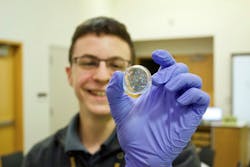Building 3D Talent from the Inside
In recent years regenerative manufacturing, which is the process of engineering human cells, tissues and organs in an effort to restore or establish normal function, has advanced to the point where companies are manufacturing bioprinters. Using 3D technology, the printer uses bioink, which are substances made of living cells, to print tissues.
Recent scientific innovations have increased the need for these printers which companies like Allevi are producing. Allevi has line of bioprinters, which has been described as plug and play desktop bioprinting, which serves the research community at a variety of universities as well as pharmaceutical companies. Customers of the company include Johnson & Johnson, Abbvie, GSK as well as MIT, Standford, University of Pennsylvania and others.
The variety of customers for these machines indicates the two paths that the industry is currently on. “Our short- term goal is to be able to make 3D tissues for drug discovery,” explains Ricky Solorzano, CEO Allevi. “Our long-term goal is that we want to be able to eliminate the organ waiting list. At the heart of what we want to do is to have better control over biology. The more that we can accurately create the body, outside the body, the more we can predict how it will behave. This will eventually become the foundation of all aspects of medicine.”
And to create both his company’s future, and the future of personalized medicine, which is where the industry is going, talent is necessary. And time is of the essence as the field is advancing rapidly.
So Allevi has created an academy to help schools train future talent.
And the interest is definitely present as reflected by the inquiries Solorzano has received about education programs. “A big part of the journey of the new world of 3D tissue has been education. And we are trying to help people understand what is fiction versus is non-fiction.
To fill that education need the company recently announced the creation of the Allevi Academy. As Lauren McLeod, a bioengineer at the company explained when announcing the academy, “we’re always looking to the future - how to prepare for future challenges, how to revolutionize and improve on current research and methodologies...but sometimes it’s necessary to reflect on the past. We took some time to think about the education experiences that got us to where we are today. Most of us conjured up memories of an impressionable teacher, exciting project, or even an awesome field trip that sparked an excitement for learning and science. We thought to ourselves, “Why not have bioprinting be the seed of students’ excitement and learning for the field of bioengineering?”
Bioengineering is in fact that the third fastest growing job in the United States, with a projected ten-year growth of 61.7% by 2020, according to the US Bureau of Labor Statistics.
The academy partnered with high school teachers, university professors, and educators across the world to produce an accessible curriculum to arm teachers with the materials and resources needed to introduce their students to bioprinting. The curriculum enables students to develop valuable skills across multiple engineering disciplines. Included activities incorporate coding, computer aided design, engineering drawings and 3D fabrication to produce innovative solutions for situations modeled after real life tissue engineering challenges. From designing and prototyping hydrogel wound coverings, to vascularization channels for organ on a chip applications, students learn to problem solve and think critically- skills that span way beyond the field of bioengineering.
Each course includes a lesson plan with teacher notes and answers along with student labs and activities. Courses also include bioinks and consumables needed to run experiments for the entire class.
“The more we can get people minds wrapped around where are we and where we need to go helps entire industry,” says Solorzano. “We need to prepare students for the brain-storming and development process that is required in this field.”
